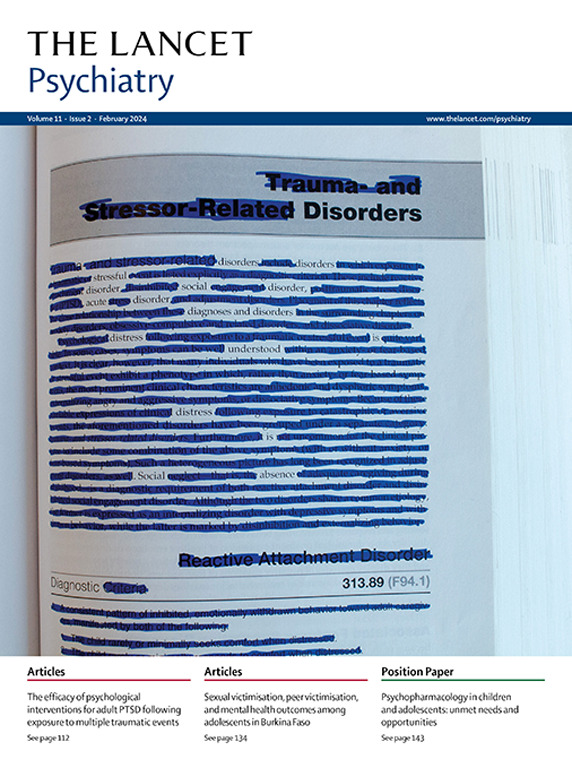Conversion practice recall and mental health symptoms in sexual and gender minority adults in the USA: a cross-sectional study
IF 30.8
1区 医学
Q1 PSYCHIATRY
引用次数: 0
Abstract
Background
Conversion practices are associated with psychological morbidity, yet few studies have evaluated differences between efforts to change gender identity, sexual orientation, or both. We aimed to examine the individual and joint association of conversion practice recall targeted at gender identity or sexual orientation, or both, with current mental health symptoms among sexual and gender minority people.Methods
This cross-sectional study used data from The PRIDE Study, a US-based, online, prospective cohort study of sexual and gender minority adults who were recruited through social media, digital advertisements, and sexual and gender minority community-based events and organisations. For this analysis, we included participants who completed a lifetime questionnaire in 2019–20 and a subsequent annual questionnaire in 2020–21 without missing outcome data. All questionnaires were in English. The exposure was lifetime recall of conversion practice targeting gender identity alone, sexual orientation alone, or both (versus no conversion practice). Mental health outcomes were continuous measures: Generalized Anxiety Disorder 7-item scale, Patient Health Questionnaire 9-item (depression) scale, Post-Traumatic Stress Disorder Checklist 6-item scale, and Suicide Behaviors Questionnaire–Revised scale. We used linear regression to analyse the associations of conversion practice recall and mental health symptoms, controlling for demographic and childhood factors and stratified between cisgender and transgender and gender diverse groups. Sensitivity analyses evaluated the potential impact of unmeasured confounding. Analyses were conducted in R. We included people with related lived experience in the design and implementation of this study.Findings
Of 6601 participants who completed the lifetime questionnaire in 2019–20, 4440 completed the subsequent annual questionnaire in 2020 or 2021, and 4426 did not have missing outcome data. Of the 4426 included participants, 4073 (92·0%) identified as White (either alone or in combination with other ethnoracial options), 460 (10·4%) identified with multiple ethnoracial identities, and 1923 (43·4%) were transgender and gender diverse. Participants' age ranged from 18 years to 84 years (median 31·7 years, IQR 25·5–44·1). 149 (3·4%) participants reported sexual orientation-related conversion practice alone, 43 (1·0%) reported gender identity-related conversion practice alone, and 42 (1·0%) reported both. Recalling both forms of conversion practice was most strongly associated with greater post-traumatic stress disorder (PTSD; β 2·84, 95% CI 0·94–4·74) and suicidality (2·14, 0·95–3·32) symptoms. Recall of only sexual orientation-related conversion practice was associated with greater symptoms of PTSD (1·10, 0·22–1·98). Recall of gender identity-related conversion practice alone was most strongly associated with greater depressive symptoms (3·24, 1·03–5·46). Only associations for suicidality differed between cisgender and transgender and gender diverse participants, although the latter showed higher mental health symptoms overall. Findings were moderately robust to potential sources of unmeasured confounding in sensitivity analysis.Interpretation
Recall of conversion practice exposure was associated with a range of mental health symptoms among sexual and gender minority people. These findings support calls to ban conversion practices because of their effects as a structural determinant of mental health.Funding
Gill Foundation, Dona Rockstand, and Patient-Centered Outcomes Research Institute.美国性少数群体和性别少数群体成年人的转化实践回忆与心理健康症状:一项横断面研究
背景转换行为与心理发病率有关,但很少有研究对改变性别认同、性取向或两者的努力之间的差异进行评估。我们旨在研究针对性别认同或性取向或两者的转换行为回忆与性少数群体和性别少数群体当前心理健康症状的个体和联合关联。方法这项横断面研究使用了 "PRIDE研究 "的数据,该研究是一项基于美国的在线前瞻性队列研究,研究对象是通过社交媒体、数字广告以及性少数群体和性别少数群体社区活动和组织招募的性少数群体和性别少数群体成年人。在本次分析中,我们纳入了在 2019-20 年完成终生问卷调查的参与者,以及在 2020-21 年完成后续年度问卷调查且未遗漏结果数据的参与者。所有问卷均使用英语。调查对象在一生中回忆过仅针对性别认同、仅针对性取向或两者兼有的转换行为(相对于没有转换行为)。心理健康结果为连续测量:广泛性焦虑症 7 项量表、患者健康问卷 9 项(抑郁)量表、创伤后应激障碍清单 6 项量表和自杀行为问卷修订版量表。我们使用线性回归分析了转换实践回忆与心理健康症状之间的关联,同时控制了人口统计学和童年因素,并对顺性别群体、跨性别群体和性别多元化群体进行了分层。敏感性分析评估了未测量混杂因素的潜在影响。我们让有相关生活经验的人参与了本研究的设计和实施。研究结果在 2019-20 年完成终生问卷调查的 6601 名参与者中,有 4440 人在 2020 年或 2021 年完成了随后的年度问卷调查,有 4426 人没有缺失结果数据。在这 4426 名参与者中,有 4073 人(92-0%)被认定为白人(单独或与其他人种选项结合),460 人(10-4%)被认定为多重人种,1923 人(43-4%)是变性人和性别多元化者。参与者的年龄从 18 岁到 84 岁不等(中位数为 31-7 岁,IQR 为 25-5-44-1)。149(3-4%)名参与者仅报告了与性取向相关的转化实践,43(1-0%)名参与者仅报告了与性别认同相关的转化实践,42(1-0%)名参与者报告了两种形式的转化实践。回忆起这两种形式的皈依实践与创伤后应激障碍(PTSD;β 2-84, 95% CI 0-94-4-74)和自杀(2-14, 0-95-3-32)症状的加重有最密切的关系。只有回忆起与性取向相关的皈依实践,才会出现更多的创伤后应激障碍症状(1-10,0-22-1-98)。仅忆及与性别认同相关的皈依实践与抑郁症状加重的关系最为密切(3-24,1-03-5-46)。只有自杀倾向的相关性在顺性别者、跨性别者和性别多元化者之间存在差异,尽管后者总体上表现出更高的心理健康症状。在敏感性分析中,研究结果对潜在的未测量混杂因素具有适度的稳健性。这些研究结果支持禁止转换行为的呼吁,因为转换行为是心理健康的结构性决定因素。
本文章由计算机程序翻译,如有差异,请以英文原文为准。
求助全文
约1分钟内获得全文
求助全文
来源期刊

Lancet Psychiatry
PSYCHIATRY-
CiteScore
58.30
自引率
0.90%
发文量
0
期刊介绍:
The Lancet Psychiatry is a globally renowned and trusted resource for groundbreaking research in the field of psychiatry. We specialize in publishing original studies that contribute to transforming and shedding light on important aspects of psychiatric practice. Our comprehensive coverage extends to diverse topics including psychopharmacology, psychotherapy, and psychosocial approaches that address psychiatric disorders throughout the lifespan. We aim to channel innovative treatments and examine the biological research that forms the foundation of such advancements. Our journal also explores novel service delivery methods and promotes fresh perspectives on mental illness, emphasizing the significant contributions of social psychiatry.
 求助内容:
求助内容: 应助结果提醒方式:
应助结果提醒方式:


